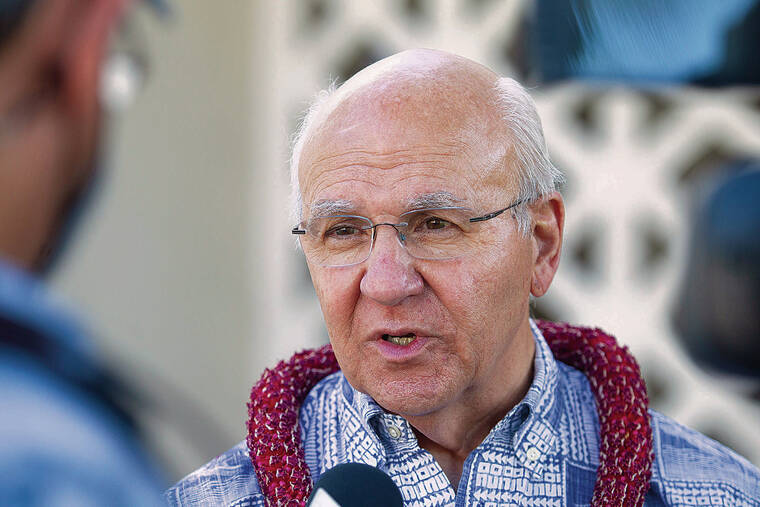Honolulu Mayor Rick Blangiardi stopped short of announcing any policy changes Wednesday during a press conference with Hawaii’s hospital leaders, but implored residents to get tested and boosted amid the recent COVID-19 surge in omicron cases.
“We’re not planning on adding any restrictions right now,” Blangiardi said.
However, he was considering adding the booster shot to be considered fully vaccinated for the Safe Access O‘ahu plan that requires people to present proof of vaccination or a negative COVID-19 test to access establishments such as restaurants and bars.
He is taking into consideration Gov. David Ige’s decision on whether or not to implement a booster shot requirement for the state’s Safe Travels program. Currently, travelers to Hawaii only need to be fully vaccinated, but not boosted or show a negative COVID-19 test in the last 72 hours, in order to skip a five-day quarantine period upon arrival.
“I did tell the governor that we will consider moving Safe Access O‘ahu in tandem with that. A lot of it is going to depend on the booster level and where we are over the next couple of weeks,” Blangiardi said.
“There’s an economic consequence to that … An overriding recommendation is if you are eligible to get a booster, get a booster. Whether or not we make it part of Safe Access O‘ahu … that’s still something we’re evaluating.”
Blangiardi mentioned that Feb. 18 was being considered as a start date for the Safe Travels program to also include booster shots.
However, in an email, a spokesperson from the governor’s office said Ige was unable to comment at this time to confirm the date.
Blangiardi did not respond to a request from the Honolulu Star-Advertiser asking if the governor spoke to him about that date.
The latest Hawaii COVID-19 vaccine summary reported 2,659,585 vaccine doses were administered through state and federal distribution programs as of Wednesday. Health officials said 75.3% of the state’s population is now fully vaccinated, 81.2% received at least one dose and 30.7% have received a third dose.
Hawaii Department of Health officials reported 3,026 new confirmed and probable coronavirus infections on Oahu on Wednesday and 3,929 statewide.
By island, Oahu has 40,603 active cases, the Big Island has 5,163, Maui has 7,361, Kauai has 2,990, Molokai has 290 and Lanai has 151.
Out of the 2,400 hospitalized patients in the state, 399 are infected with COVID-19, said Healthcare Association of Hawaii President and CEO Hilton Raethel.
However, he noted that many of those who are hospitalized with COVID-19 came into the hospital for other health issues, but tested positive after being admitted.
At Kaiser, those types of COVID-19 cases make up about 50% of its hospitalizations, estimated Kaiser Foundation Health Plan and Hospitals — Hawaii Market President Greg Christian.
“We have 38 COVID patients, about half of them though didn’t come in for … the diagnosis of COVID,” he said.
“Folks don’t even know it, and we test them and they find out they’ve been asymptomatic … they’re in our accounts and that’s important, because it requires a lot of added additional care.”
Both Hawaii Pacific Health President Ray Vara and The Queen’s Health Systems President Jill Hoggard Green have not kept counts separating hospitalized case counts due to COVID-19 from cases where patients test positive for COVID-19 after being admitted for a different reason.
They said it is often difficult to tell if COVID-19 is exacerbating underlying health issues in these patients.
“We can’t tell whether COVID activated a chronic condition that you had, or whether the chronic condition and COVID commingled at the same time,” Green said.
The state’s documented infection rate was four times last week than what it was during the peak of the delta surge, according to Raethel.
Hawaii health officials said the state’s electronic data collection system for cases has become so overwhelmed by the number of test results that it stopped processing negative test results on Sunday. The move should provide a more accurate daily count of positive cases, but the change means that the state will not be able to calculate the case positivity rate, officials said.
Green noted that there is increasing research about the amount of antibodies created after a COVID-19 infection and that people who are not boosted, but were recently infected by the virus should consult with a physician when they should get their third vaccine dose.
“Lots of clinicians are encouraging their people to come back and get their boosters in about 90 days,” she said.
“It’s a relatively short period of time. So definitely talk to your physician, they know you and they’ll be able to help you navigate how fast you get back for your booster.”
In response to the strained healthcare workforce, Raethel said the state will bring in an additional 400 nurses from the mainland to start next week to relieve Hawaii hospitals that have health care workers currently in quarantine due to COVID-19 exposure.




